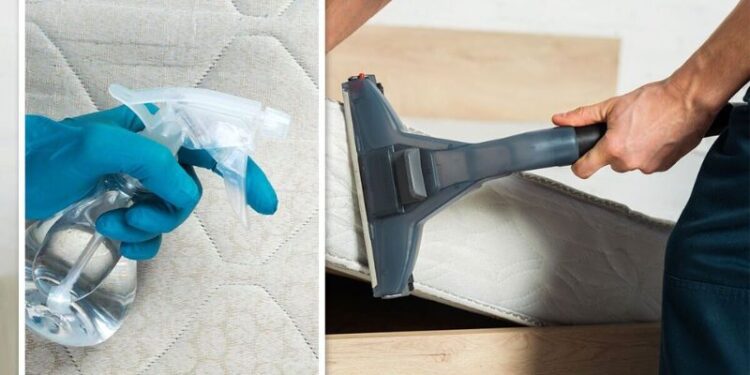When it comes to maintaining a clean and hygienic sleeping environment, cleaning your mattress is just as important as washing your sheets. Over time, mattresses can accumulate dust, allergens, and stains, which can affect both the longevity and comfort of your bed. While there are many commercial cleaning products available, natural methods offer an eco-friendly and chemical-free approach to mattress cleaning. In this article, we will explore “What Are Some Natural Methods to Clean a Mattress?” and ensure a fresh and healthy sleep surface.
Why Choose Natural Methods?
Before we delve into the specific natural cleaning methods, let’s discuss why you should consider using them in the first place. Here are some compelling reasons:
- Safety: Natural methods utilize non-toxic ingredients, eliminating the risk of harmful chemicals coming into contact with your skin or respiratory system.
- Eco-Friendly: By using natural ingredients, you minimize your impact on the environment, as they are biodegradable and sustainable.
- Cost-Effective: Natural cleaning methods often rely on household items, making them a budget-friendly alternative to commercial cleaning products.
- Gentle Yet Effective: Despite their gentleness, natural cleaning methods can effectively eliminate stains, odors, and allergens, leaving your mattress fresh and clean.
Now that we understand the advantages of natural mattress cleaning, let’s explore some tried-and-tested methods you can implement.
What Are Some Natural Methods to Clean a Mattress?
-
Vacuuming
One of the simplest and most effective ways to remove dust, dead skin cells, and other debris from your mattress is through regular vacuuming. Follow these steps:
- Start by removing all bedding and pillows from the mattress.
- Attach the upholstery attachment to your vacuum cleaner.
- Vacuum the entire surface of the mattress, paying special attention to seams, crevices, and corners.
- Repeat the process on both sides of the mattress.
For added freshness, sprinkle baking soda over the mattress before vacuuming. Leave it for about 30 minutes to absorb odors, then vacuum it up.
-
Baking Soda Deodorizing
Baking soda is a versatile household ingredient known for its odor-absorbing properties. Follow these steps to deodorize your mattress:
- Strip off all bedding and pillows.
- Sprinkle a generous amount of baking soda over the entire mattress surface.
- Gently rub the baking soda into the fabric using a clean brush or sponge.
- Let the baking soda sit for several hours, or ideally overnight.
- Vacuum the mattress thoroughly to remove the baking soda residue.
-
Stain Removal with Vinegar and Baking Soda
Accidental spills and stains are inevitable on mattresses. Fortunately, a combination of vinegar and baking soda can help remove these stubborn stains. Follow these steps:
- Mix equal parts of white vinegar and water in a spray bottle.
- Spray the stained area lightly with the vinegar solution.
- Blot the stain gently with a clean cloth or sponge, starting from the outer edge and working your way inward.
- After removing the stain, sprinkle baking soda over the affected area to absorb any remaining moisture and odor.
- Allow the baking soda to sit for a few hours before vacuuming it up.
-
Freshening with Essential Oils
Essential oils not only add a pleasant fragrance to your mattress but also possess natural antimicrobial properties. Here’s how you can freshen your mattress with essential oils:
- Dilute a few drops of your favorite essential oil, such as lavender or tea tree oil, in a spray bottle filled with water.
- Lightly mist the mattress surface with the diluted essential oil.
- Allow the mattress to air dry completely before making the bed.
FAQs About Natural Mattress Cleaning
FAQ 1: Can I clean a mattress without a vacuum cleaner?
Yes, if you don’t have a vacuum cleaner, you can use a clean, damp cloth to wipe the mattress surface and remove any loose debris. However, using a vacuum cleaner is recommended for a more thorough clean.
FAQ 2: Can I use hydrogen peroxide to remove mattress stains?
While hydrogen peroxide is effective in removing stains, it’s important to test it on an inconspicuous area of the mattress first to ensure it doesn’t cause discoloration. Additionally, hydrogen peroxide should be used sparingly and in a diluted form.
FAQ 3: How often should I clean my mattress?
It’s advisable to clean your mattress every three to six months to maintain its cleanliness and prolong its lifespan. However, if you suffer from allergies or have pets, more frequent cleaning may be necessary.
FAQ 4: Can I use a steam cleaner on my mattress?
Steam cleaning can be effective in killing dust mites and removing stains from a mattress. However, it’s essential to follow the manufacturer’s instructions and ensure your mattress is suitable for steam cleaning.
FAQ 5: How long does it take for a mattress to dry after cleaning?
The drying time can vary depending on factors such as humidity levels and ventilation. It’s recommended to allow the mattress to air dry completely before covering it with bedding.
FAQ 6: Can I use natural methods to clean a memory foam mattress?
Yes, natural methods are safe to use on memory foam mattresses. However, it’s important to avoid excessive moisture and ensure the mattress is thoroughly dried to prevent mold or mildew growth.
Conclusion
Regularly cleaning your mattress using natural methods is not only beneficial for your health but also contributes to the longevity of your bed. By following the techniques outlined in this article, you can easily eliminate dust, stains, and odors from your mattress, ensuring a fresh and hygienic sleep environment.
Remember to choose natural ingredients, test any cleaning solutions on inconspicuous areas, and prioritize proper drying to avoid any potential damage. With these natural methods, you can enjoy a clean and comfortable mattress for years to come.

